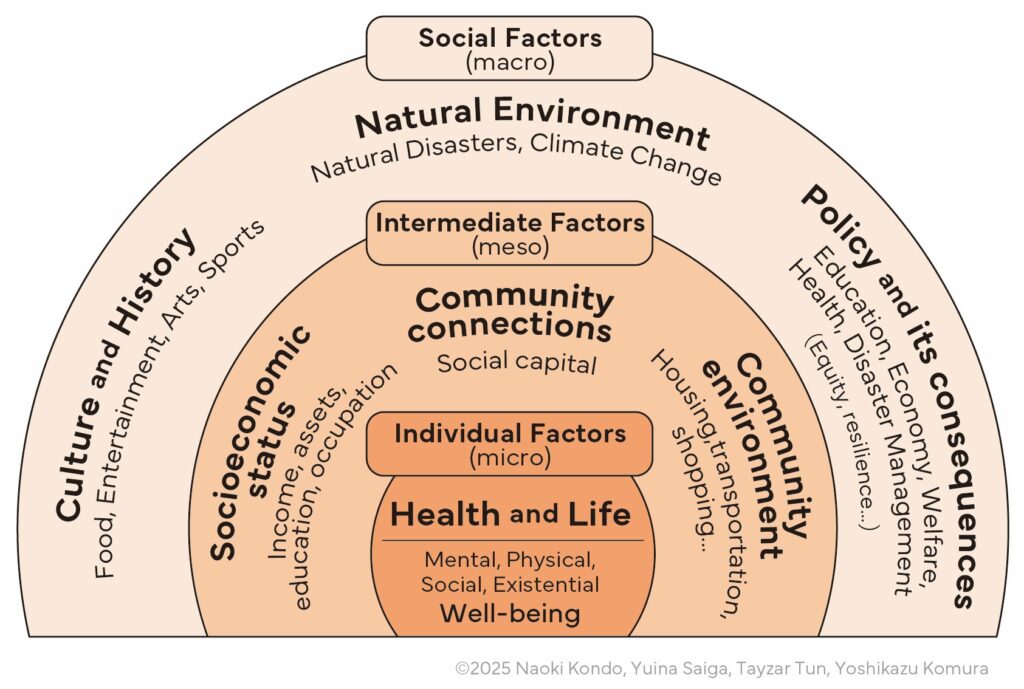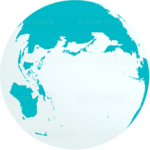倉廩実則知礼節 衣食足則知栄辱
If you have a good warehouse, you know your manners,
and if you have enough food and clothing, you know your honor and shame.
This phrase is Dr. Kondo’s motto. People’s health is affected by social circumstances such as education, income, occupation, and their relationships with others. People’s health is also affected by the social environment, such as national and regional policies, culture, economic trends, and income inequality. If you are hungry every day, it will be difficult for you to live your life with the people around you. It is also difficult to live a solitary life without help from others.
Public health aims to create a system to protect people’s healthy lives. Based on epidemiological research methods, our laboratory aims to unravel the relationship between society and health, control the health disparities that arise, and create a healthy and equitable society. We aim to improve the health and welfare of people while working in close collaboration with others in related disciplines such as sociology, economics, behavioral science, policy science, and political philosophy.

Current Research Topics
Japan Gerontological Evaluation Study (JAGES)
![]() JAGES is an international collaborative study on the social determinants of health among the elderly, involving 200,000 people in about 60 municipalities nationwide and in two foreign countries.
JAGES is an international collaborative study on the social determinants of health among the elderly, involving 200,000 people in about 60 municipalities nationwide and in two foreign countries.
Social Prescribing and Building a Inclusive Society (kyosei-shakai:共生社会)
Our goal is to prevent patients who have been treated from returning to the environment that made them sick. In order to achieve this goal, we are aiming to create a system of “social prescribing” that allows medical care and community welfare to work closely together and participate in the creation of a inclusive society. In relation to this, we are developing a survey form that will be used in medical settings to screen patients’ life issues, developing a health management support system for welfare users, and conducting follow-up research on people who have used “Free/Low-cost Medical Services” at hospitals.
【National Academy for Social Prescribing】
Development of new health promotion services in collaboration with companies and the government
We aim to achieve health equity, developing “social services that allow people to naturally engage in health promotion.” A number of projects are currently underway, including the “Kenshinsen” (Hakuhodo), an occupational health checkup to fight against last year’s self, online pregnancy and childcare counseling (Kids Public), and verification of the effectiveness of health management using health app data (Link and Communication, Renaissance, etc.).
The website of Kids Public (in Japanese)
The website of Link & Communication (in Japanese)
Information on the SIB demonstration project in Yokohama City (PDF file) (in Japanese)
Applications of Causal Inference and Machine Learning
In social epidemiology, it is important to unravel and carefully consider causal relationships. Recent developments in information technology have also made it possible to apply machine learning in various contexts (e.g., building predictive models, estimating causal effects, evaluating heterogeneity of effects, etc.). Our laboratory is creating world-leading evidence by applying evolving causal inference and machine learning to data from Japan and the United States.
Click here for an introduction to our research.
Creating a convivial society where everyone can “be themselves” through art
We aim to create a convivial society where everyone can “be themselves” through art communication that integrates welfare, medicine, and technology. This laboratory oversees the Evidence Building Section (R&D Project 5) of the “Arts-based communication platform for co-creation to build a convivial society,” a large-scale joint R&D project (JST Co-Creation Project) led by the Tokyo University of the Arts in collaboration with 41 institutions.
Planetary Health Sciences
 It is no good if only humans become healthy. We are conducting basic research to build a system of “sampo yoshi” – earth, creatures, and people (in collaboration with the Institute for Future Initiative at the University of Tokyo).
It is no good if only humans become healthy. We are conducting basic research to build a system of “sampo yoshi” – earth, creatures, and people (in collaboration with the Institute for Future Initiative at the University of Tokyo).
The website of the Institute for Future Initiatives, The University of Tokyo
Click here for more information on Naoki Kondo’s research projects funded by the Japanese government
